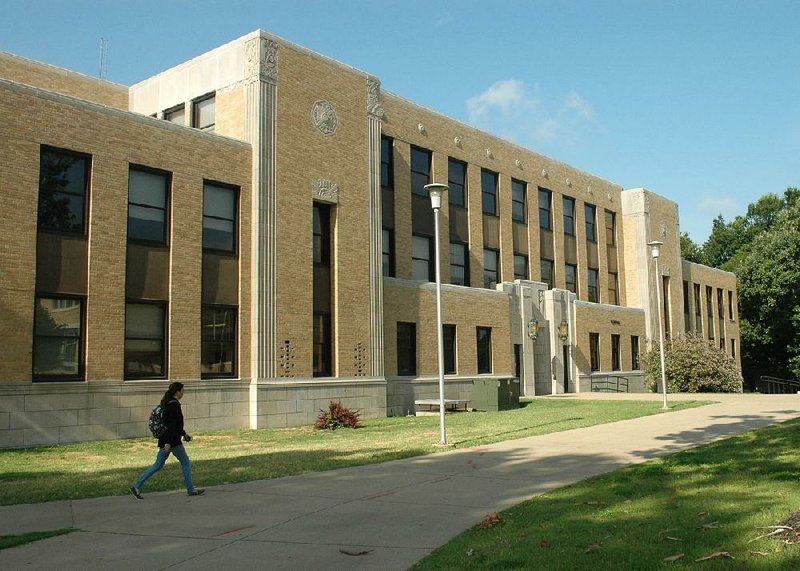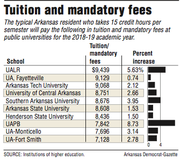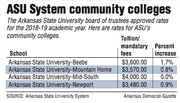The Arkansas State University System on Thursday became the last state institution of higher education to approve a plan to keep tuition flat while increasing fees, following a recommendation the governor issued in January.
For the 2018-19 school year, in-state full-time students at public, four-year universities in Arkansas face annual costs ranging from $7,128 to $9,439 in tuition and mandatory fees. Arkansas State University in Jonesboro will have one of the lowest percentage increases in rates at 1.53 percent, while the University of Arkansas at Pine Bluff had the highest at 8.73 percent.
The University of Arkansas at Little Rock and the University of Arkansas, Fayetteville, will charge the most in tuition and fees, while the University of Arkansas at Fort Smith will have the lowest rate, according to figures provided by the institutions.
Unlike in Arkansas, higher- education systems in Texas, Mississippi and Missouri approved tuition increase proposals at the states' public schools.
The ASU System board of trustees also kept in-state tuition flat for its four community colleges. Three of the four increased mandatory fees, with Arkansas State University-Beebe seeing the highest rate increase of 1.7 percent. Arkansas State University Mid-South in West Memphis did not raise fees.
The system said the fee increases will mainly fund added security measures on campuses and raises for faculty.
ASU-Jonesboro's rate -- $8,608 in tuition and fees for the 2018-19 academic year for an Arkansas resident taking 15 credit hours at the state's second-largest four-year institution -- now falls roughly in the middle of those of the state's public universities. The school's enrollment was just shy of 14,000 in fall 2017, according to the state Department of Higher Education.
"I think that our campuses did a terrific job," ASU System President Chuck Welch said, calling the plan conservative and efficient.
The ASU System receives 44 percent of its funding from tuition and fees and 36 percent from the state, according to Welch's office.
State institutions of higher education will be receiving an additional $10 million in funding from the Arkansas General Assembly, which Gov. Asa Hutchinson requested in January. That money will be distributed based on a productivity funding formula, with some schools having it added to their base funding and some getting one-time contributions.
Leaders at other institutions said this year's plans aim to avoid putting financial strain on students.
"At a time when state funding for higher education is static and the cost of operating and maintaining college and university campuses is increasing, we have to find ways to offset those costs while striving not to create an undue financial burden for our students," said Karla Hughes, chancellor for the University of Arkansas at Monticello in a statement.
University of Central Arkansas President Houston Davis said his school increased specific and targeted fees in addition to ramping up fundraising efforts and reallocating funds. That allowed the Conway university to still address its top priorities, which include student success initiatives, the first phase of its technology upgrade and rising facility costs.
Arkansas Tech University President Robin Bowen also said she was confident her school's budget would allow students to get a positive return on their investment.
University of Arkansas at Little Rock Chancellor Andrew Rogerson said nearly half of the school's overall fee increase will go toward implementing a University of Arkansas System information technology infrastructure system that is designed to improve student services and university business systems. The rest will fund deferred maintenance for critical infrastructure and other maintenance needs, health services and academic program technology.
"We are very sensitive to any increases and committed to an affordable education for our students," Rogerson said in a statement. "The majority of gifts in our current capital campaign will go to student scholarships. We are working with prospective students and parents and current students to help them access scholarships and financial aid so they can obtain a degree with minimal debt."
Welch, the ASU System leader, said an increase in security fees for ASU came after a request from the Student Government Association to address students' concerns, some of which were in light of state law now allowing people with an enhanced license to carry a concealed handgun on campus.
The fee increases at the ASU System's community colleges will also go toward security, as well as improvements to technology, among other things, Welch said.
He said cost-saving measures in the system's budget will allow the schools to offer the same services without increasing tuition, though that might not be sustainable in following years.
Welch said he feels confident that ASU's enrollment will continue to provide a funding base, though enrollment at two-year colleges tends to fluctuate based on the economy.
A Section on 06/01/2018



